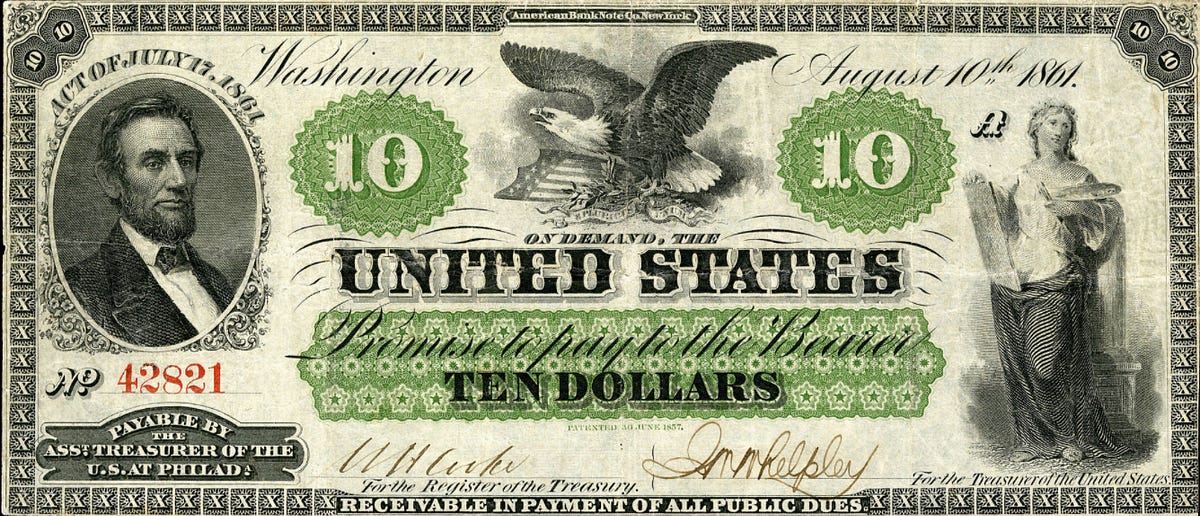Dear Crypto Natives,
I’m convinced Ray Dalio is a crypto guy and just doesn’t know it yet.
Last week he released this piece.
He goes through the history of money. He says a variation of the following cycle repeats throughout history—often every 50-75 years:

You start with Type 1 hard money—a money system no one can inflate—this money has the characteristic of trustless issuance and credible neutrality. Gold, silver, copper—these made good hard monies at different points in history.
But this hard money is inconvenient—bad UX. Precious metal is hard to store. It’s hard to verify. So a third-party comes in. The bank! Banks improve the UX of hard money. Banknotes emerge. These are redeemable notes for hard money but with better transaction networks—more divisible, easier to secure, better for payment!

But another set of problems creeps in. Banking is a game of network effects. So a small group of banks come to dominate. These become centralized power structures, able to bend the will of politicians in their favor. Then fractional reserves, banks runs, national emergencies—the rise of problems like these causes banking to inevitably transform into public/private systems orchestrated by nationalized central banks.
After this it’s only a matter of time before the transition to fully type 3 fiat money—a system no longer backed by hard money. It turns out money is a shared myth—a point system for value, a meter stick. It’s easy enough to swap out the hard money myth for the fiat money myth so long as everyone keeps believing.
It doesn’t happen immediately. Rivalrous nations keep the fiat impulse in check at first. A world of multilateral powers prefers a hard money standard—that way no major nation has to cede control of the world money printer to another. But in eras of unilateral power (such as post-world War II) the currency of one empire comes to dominate. And after that you’re just a few decades away from fiat.
(Above) Watch Nixon “temporarily suspend” the convertibility of the dollar into gold
Dalio drops an interesting possibility—maybe this decade is the beginning of a reset from “Type 3—fiat” back to “Type 1—hard money”.
And I’d add something more: maybe the new hard money is composed of crypto.
But here’s the problem—a new crypto system won’t be better unless it’s bankless
Remember what happens with money systems?
You start with a hard money, it’s peer-to-peer, a bit clunky to use, but it’s gloriously permissionless—then the banks come in to solve UX.
Before long you’ve transitioned to a banknote system. Back on the path to fiat.
Is this what’ll happen to Bitcoin?
Banks to solve Bitcoin payments. Banks to solve Bitcoin lending and trading.
Let’s extrapolate forward:
Take scaling—at only 10 transactions per second the Bitcoin network only works as a global settlement layer for crypto banks. In the absence of layer 2 adoption like Lightning, all Bitcoin TRANSFER functions must occur through the crypto banks.
Or take programmability—the expressivity limitations of Bitcoin mean:
If you want to LEND, BORROW, TRADE on the Bitcoin network it tends to require a crypto bank—a Binance rather than a Uniswap.
For a money system to remain bankless it must:
- Scale trustless transactions per second of its base layer network
- Be expressive enough to perform banking functions via trustless protocols
Banks are great for adoption at first. But they become a vector for centralization later. For a money network to remain independent it must perform money verbs without a bank as a trusted third party.
Yes, Ethereum is a major improvement here. But no I don’t think Ethereum is immune to the threat of crypto bank centralization. If Ethereum’s STAKE money verb becomes owned by crypto banks it’s bad. If core DeFi protocols become more like crypto banks over time and less like credibly neutral machines it’s bad.
We must remain on guard.
It’s funny…someone recently asked me if I’m an Ethereum maximalist.
Nope. Not in the slightest.
But I am a bankless maximalist.
- RSA
P.S. For a summary on the history of money check out Episode #2 of Bankless Podcast
